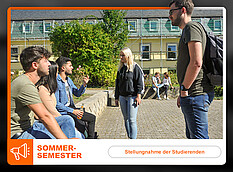Summer Semester on Campus [21.02.22]
Policymakers announced fewer restrictions for spring. That means the signs are good for a return to campus in the summer semester. Why it is so important that everyone pulls together now for this and what lessons should be learned from the winter semester are reported by student representatives and the Vice President for Academic Affairs over coffee with the Online Courier.Interview with:
- Prof. Dr. Korinna Huber, Vice President for Academic Affairs
- Nayana Kramer, StuPa President and student Senate member, Nutritional Science B.Sc.
- Milena Kugel, student Senate member, Education for Business and Economics B.Sc.
- Judith Blättler, student Senate member, Agricultural Science B.Sc.
To the students in the round: How are you doing after the fourth pandemic semester?
Kugel: I'm entering my 6th semester of Education for Business and Economics. I experienced one semester on campus, then I went to remote learning. At first glance, that worked out quite well. The content of the degree programs in Business Administration and Economics tends to be theory-based. That means you can learn the material quite well at home if necessary.
But as time went by, I envied students with lab internships or other practical exercises more and more. At least they had the opportunity to meet their fellow students on campus from time to time. For most WiPäds and WiWis, this completely disappeared from one moment to the next.
I am glad that I got to know it differently, at least for a short time. In the first semester, I was able to make a lot of contacts and, for example, joined the student representatives for the departments (Fachschaft). There, however, we can already see that many students are really frustrated at the moment.
Kramer: I'm in my 8th semester of nutritional science, so I had a chance to know real campus life. My impression is that many new students only have a rough idea of what they are actually missing out on at the moment. Studying is so much more than cramming for exams. Eating together in the Mensa, studying, or partying together in the TMS, chilling in the park, getting involved in student groups, university sports... That's student life that I will remember many years from now.
Ms. Blättler, you started your studies under Covid conditions, right?
Blättler: That's right. I moved to Stuttgart in the winter semester of 2020/21 specifically for the Bachelor's program in Agricultural Sciences and was already looking forward to meeting lots of new people and getting new impulses. However, I was aware that Covid would restrict my studies in many ways.
I was all the more glad that there were at least a few events on campus in the first semester, such as the first semester academy of the AKN or the introduction days of the student representatives for the departments (Fachschaft). But it wasn't until last winter semester when there were finally more courses on campus that I really got to know people.
I noticed that many lecturers really worked hard to get the best out of the circumstances for us. Unfortunately, towards the end of the winter semester, some of the courses were moved back to digital because of the infection rates. I couldn't really understand why. At no time did I feel unsafe at the university. My impression is that the Hohenheim hygiene concept is effective. At any rate, I didn't hear anything about Covid outbreaks at the university.
But at least I was able to get to know some fellow students during the first few months in the fall. Now, when we prepare for exams together, it's a completely new experience for me.
Ms. Huber, as Vice President for Academic Affairs, you have the big picture in mind. Do you think these descriptions are typical of the student generation?
Huber: In my opinion, the student representatives here are only partially representative, as they are more involved than average and actively participate in networks. But we cannot assume that this is the case for all students.
Psychologists tell us: not being present has massive consequences for the generation affected, and these consequences will continue to have an impact for a long time: For learning, for social competence, for motivation. This can have an impact on academic success and later also on the start of a career.
The fatal thing is that those who suffer most from the pandemic are often "invisible" to lecturers because they tend to withdraw further and further. Learning deficits, motivation problems, and psychological problems can lead into a negative spiral from which it is difficult to extricate oneself. Attendance offers that are not binding may then not be taken up at all, although this is precisely what would break the vicious circle.
Our pedagogical mission as a university is therefore clear: We must also get these students out of their shells again for their own good. And we must give those eager to learn, who are already impatiently waiting to finally get a whiff of campus air again, comprehensive opportunities to do so. We owe that to the young people.
The University of Hohenheim had already announced considerably more presence for the past winter semester. Ms. Blättler has described her experiences in the Bachelor's degree programs in Agricultural Sciences. How did it go with the others?
Kugel: Unfortunately, I have to say that things didn't go as well in the Business Administration and Economics degree programs. Many students were only offered one or two on-campus events per week. After the original announcements, that was a disappointment.
Some lecturers said that students didn't want to attend more courses and that existing courses were poorly used. But let's be honest: It's hardly worth coming to the university because of one event per week. Many students have not even looked for a room near the university.
Kramer: Another problem is that online and face-to-face courses were usually not coordinated. It's not that easy to find a good place on campus to log on to a Zoom event between two face-to-face courses. Unfortunately, there is also a general lack of study spaces to make good use of downtime on campus. That, too, has certainly contributed to some students choosing the digital option for hybrid events.
Blättler: I think lecturers should generally not be guided by supposed majorities on this issue. What does it mean, for example, if 60% or even 70% of the participants say that they prefer to learn at home? Then there are still 30-40% who would rather be on site! I think the university should orientate itself on these active students, who can then also pull others along.
Zum Thema |
|---|
Der Senat hat in einer Resolution beschlossen, dass Präsenz im Sommersemester die Regel, Online die Ausnahme sein soll. Eine bessere Abstimmung soll für eine bessere Studierbarkeit sorgen und den permaneten Wechsel zwischen Online und Präsenz reduzieren. Die Verfasste Studierendenschaft stellt sich mit einer eigenen Stellungnahme hinter die Senatsresolution. |
I'm thinking here, for example, of the internationals who have come to Germany especially to experience studying on campus and to make contacts here. German students also miss out on a lot of the international character of the university when they are at home.
Ms. Huber, can you rule out the possibility that the problems you mentioned will recur in the summer semester?
Huber: The Senate has made a very clear recommendation: attendance should be the rule in the summer, online the exception. Hybrid events are no longer recommended. Lecturers, degree program directors, and coordinators are called upon to coordinate better with each other so that students can be present on campus in blocks if possible and online lectures take place at off-peak times or on other days.
It is now important that these guidelines can be implemented consistently in the individual degree programs. However, our schedules are a somewhat rigid structure, which does not make it easy to introduce the necessary changes. At the same time, I hope that our students will then actually take advantage of the face-to-face courses. In any case, I am trying to convince them at all levels to switch to face-to-face courses.
Politicians have announced a relaxation of the regulations in the spring. That can make us feel optimistic for the time being, can't it?
Huber: Yes, an end to most of the restrictions seems conceivable before the start of the semester. Therefore, there is no longer any reason for the majority of courses to be held in online format for pandemic reasons. We only want to keep online formats that make didactic sense. However, the studyability of the entire degree program must be kept in mind.
The learning station situation should also ease somewhat during the warmer months of the year because the outdoor areas can also be used. We are also currently examining where we can set up additional seating with WiFi reception as outdoor learning spaces.
However, we have to be realistic that there will still be differences between individual degree programs in the summer semester. In the Bachelor's degree program in Business Administration and Economics, for example, there are very large courses that will probably continue to be held online.
Nevertheless, I am convinced that if everyone pulls together now, we can achieve significant improvements in all degree programs.
This week, the student body issued its own statement on the summer semester. What prompted it?
Kramer: We wanted to make it clear that the students are fully behind the Senate resolution. As Ms. Huber said, it is now a matter of implementation. We call on all those responsible to do their part to ensure that the problems of the winter semester are not repeated and that we all meet regularly on campus again in the summer semester.
Blättler: At the same time, it's important for us to say that we don't fundamentally reject digital formats. We think it's right that the university now wants to use the experience gained from the pandemic to drive digitalization forward in the longer term as well, for example with projects like DeLLFi or PePP. Online teaching should then, of course, no longer be an improvised stopgap solution, but a high-quality supplement to presence.
Ms. Huber, why does the Senate only make recommendations and not clear guidelines?
Huber: The constitution guarantees the freedom of teaching. That's why something like this must have very broad support among professors. I had hoped that we would be able to achieve something more binding in the summer semester. But the discussion in the Senate showed me that we need a somewhat longer lead time for this. My goal is to make some progress in this regard at least by the winter semester.
Then, with a certain degree of probability, we will be facing the next wave of infections...
Huber: That's right. And if the hygiene rules become strict again and we need more online teaching, coordinating the on-campus blocks will be a real Herculean task.
We have to prepare for that now. Together with committed lecturers from all faculties, I therefore want to develop a concrete proposal in the coming months as to what a university-wide framework schedule with binding slots for presence and online could look like. And I hope that we will then also convince the Senate.
We are a small university - that could be our strength in this case. If the project succeeds, we could also benefit from such a framework schedule after the pandemic, for example in the integration of digital elements in the face-to-face degree programs. That would then be a real competitive advantage over large universities that react less flexibly.
We will report back. Thank you very much for the interview!
Interview: Leonhardmair / Translation: Neudorfer



